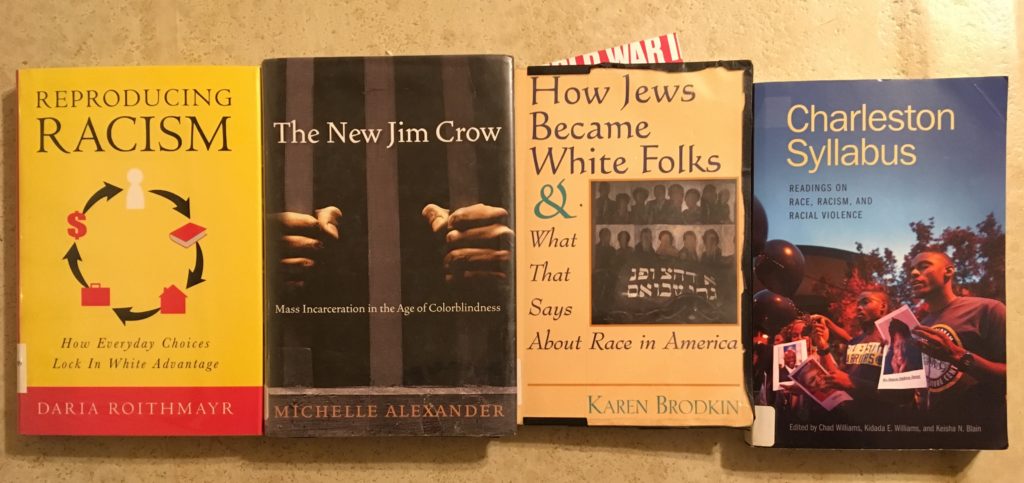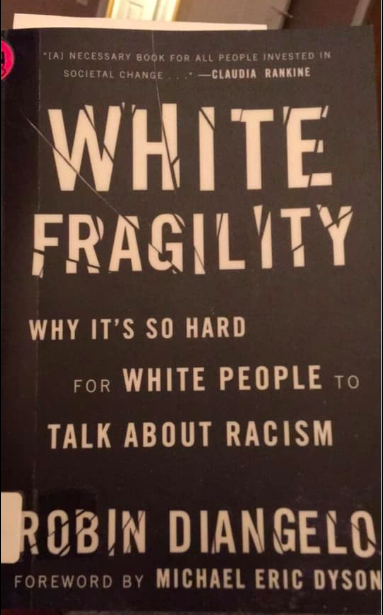Some light reading, right? First White Fragility, now Raising White Kids: Bringing Up Children in a Racially Unjust America by Jennifer Harvey.
This book is a must-read. It is a challenging but very necessary read.
I can’t help but compare this book to Simplicity Parenting by Kim John Payne. That is also a very good read I’d like to re-read again and will probably review it here.
I’d already thought about and bought into his ideas about minimizing our stuff and schedules. So the biggest take-away I took from Simplicity Parenting about a year ago was his suggestion to simplify kids’ exposure to news and other “adult” conversations. It really struck a cord with me because we were screen-free at that time except for us adults watching news over dinner. Oh yes, we break all the Good Parenting Rules and watch TV at dinner. Granted, we pause to debate frequently.
What he said resonated with me, and I knew that our nightly news would have to go sooner or later. It’s not appropriate for little ears. Spoiler alert: it probably should already be gone and isn’t.
This book threw a wrench into what I thought I knew from Simplicity Parenting.
I can’t protect my children from the world forever. Yet I can protect them from a lot of the world if I listen to Simplicity Parenting, but only because of white privilege. As I described in my review of White Fragility, I can avoid dealing with racism because I feel anxious, yet people of color with anxiety get no such reprieve. That has been the driving force for me since. This book had a similar effect on me:
Meanwhile, the reality of racial injustice raises genuinely difficult questions about what and how much to say: when to leave the radio on and when to turn it off. As one parent put it to me, “I don’t want to lie to my kids about US history and our society. But how do I talk about histories of violence – for example, what slavery or treatment of Native Americans was like? I don’t even let my eight-year-old watch violent television shows.”
How much and in what detail are, in many ways, personal parental questions that have to do with many things, including the temperment of our particular children. At the same time, just as I felt myself viscerally react to the mom who said to me, “I’m just glad she doesn’t have to worry about any of it,” I felt in the painful experience with my daughter the visceral knowledge that having chosen to allow her some heartbreak was, in fact, life-giving, humanizing, and necessary,
It’s deeply necessary we let our children’s hearts get broken a bit if they are going to remain able to recognize the humanity of their fellow humans whose lives are at stake in the system we live in. It’s necessary if they are going to grow any rooted sense of themselves as part of a larger, multiracial community of people to whom they are committed, and with and for whom they must speak out and act.
What I’m describing here goes well beyond tactical questions about teaching kids how to engage in activism. It goes beyond saying, “Well, if Black kids have to learn about police violence then so should white kids – otherwise we are just embracing white privilege.” This is certainly true, of course. But it’s a rather surface assessment of the stakes.
What I’m getting at is creating space for our kids to move into their deeply embodied relationships with injustice, as risky as that may feel. We need to create space for them to literally feel injustice and feel, touch, and ache from its real costs.What I relearned in this painful experience with my daughters was that the entire enterprise of raising white kids for racial justice requires a difficult, vulnerable recognition: in a world where human beings are suffering from human-caused injustice and violence, the humanity of even the youngest of our children is directly tied to their ability to identify with that suffering. And our children also need to explicitly come to understand that same truth.
It’s understandable we want to protect our kids. But if we confuse finding age-appropriate ways to tell the truth about racial harm with overly insulating them, if we are too cautious because we are afraid it’s just too much, if we don’t want to cause them suffering, we withhold the very things they need to participate in deeper and more truthful ways of living. Indeed, we withhold the very things they most need to retain their humanity.
Raising White Kids, p257-258
No pressure, right?
As hard as the work will be, I’m thankful to be able to start with my kids so young. I wish I could start when I was a toddler, but now is better than tomorrow. And I’m lucky to live in a much less segregated place than the one where I grew up. As powerful as White Fragility is, this book was far more practical, though I still wanted more.
The two take-aways I had from this book:
- Talk about race. Stop being silent. Discuss skin colors as you would discuss hair colors or professions. Babies pay attention to skin color from before the time they can talk. And little kids also quickly realize that they’re not “supposed” to point out skin colors or race, being shushed as soon as it’s mentioned. (See the race chapter in Nurture Shock for studies.)
- Desegregate your life. This is a much harder project. I had chosen not to see how segregated my life has always been, despite my liberal values. This is a work in progress, but I’ve started with the two easiest parts: reading and media. Of course, I’m also continuing my way through the [free!!!] Me and White Supremacy Workbook. I’m trying to find other ways to desegregate my life, and some are in the works already, but this will be a lifetime project. Just like dismantling the white supremacy subconscious within me.
Reading: about racism and the parts of history that is still relegated to “electives” in schools as well as understanding other people’s experiences and how they differ from mine as a white person. I have a lot of catching up to do. I haven’t written about this yet, but I’m (again) doing a self-created Mother’s Education Course à la Charlotte Mason and the PNEU. One of the reading categories I included is social justice and another is biographies, focusing on people notable in the fight for social justice. (I’ve read few biographies, but I’ve twice read The Autobiography of Malcolm X and highly recommend it. I’m not sure when or why I originally picked it up, but I think of his story often.) I have never learned about most of American history. Really, have you considered how much history is missing from our educations?? And there’s a lot to learn now too about the ramifications of structural racism. There’s so much I have never seen because I was trained to not see it. It’s time to see the world from a fuller, more truthful perspective. Here are the books I’ve checked out from the library right now:

Media: I have never felt like I’m “allowed” to watch or listen to “ethnic” media. Except In Living Color. I watched the heck out of that, at a much younger age than was appropriate. I think I was just too young to catch The Cosby Show, though I watched Steve Urkel and the Mowry twins. But as an adult? I cut out most media when I dropped TV at 19 because it was expensive. My media intake became much more segregated. An echo chamber of the worst kind. I started by seeking out new podcasts, then branched out into some new TV. No, I don’t understand all the references, and that’s important. In the rest of my life, people cater to my culture and my perspective. Becoming Jewish exposed me to codeswitching and being that outsider perspective, and now I’m going through that process again from yet another perspective. It’s keeping me humble, that’s for sure.
Read Raising White Kids. You won’t regret it. And if you’re a Christian, also check out her book Dear White Christians: For Those Still Longing for Racial Reconciliation. (I might read that too eventually just because.)
